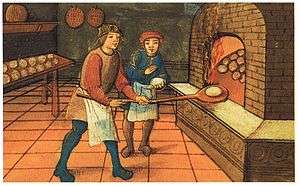Dozen
A dozen (commonly abbreviated doz or dz) is a grouping of twelve.
The dozen may be one of the earliest primitive groupings, perhaps because there are approximately a dozen cycles of the Moon, or months, in a cycle of the Sun, or year. Twelve is convenient because it has the most divisors of any number under its double, a property only true of 1, 2, 6, 12, 60, 360, and 2520.[1]
The use of twelve as a base number, known as the duodecimal system (also as dozenal), originated in Mesopotamia (see also sexagesimal). This could come from counting on one's fingers by counting each finger bone with one's thumb. Using this method, one hand can count to twelve, and two hands can count to 144. Twelve dozen (122 = 144) are known as a gross; and twelve gross (123 = 1,728, the duodecimal 1,000) are called a great gross, a term most often used when shipping or buying items in bulk. A great hundred, also known as a small gross, is 120 or ten dozen.
A baker's dozen, also known as a big or long dozen, is 13. Varying by country, some products are packaged or sold by the dozen, often foodstuff (a dozen eggs). Dozen may also be used to express a large quantity as in "several dozen" (e.g., dozens of people came to the party).[2]
Etymology
The English word dozen comes from the old form douzaine, a French word meaning "a group of twelve" ("Assemblage de choses de même nature au nombre de douze" (translation: A group of twelve things of the same nature), as defined in the eighth edition of the Dictionnaire de l'Académie française).[3][4][5] This French word[6] is a derivation from the cardinal number douze ("twelve", from Latin duodĕcim) and the collective suffix -aine (from Latin -ēna), a suffix also used to form other words with similar meanings such as quinzaine (a group of fifteen), vingtaine (a group of twenty), centaine (a group of one hundred), etc. These French words have synonymous cognates in Spanish: docena,[7][8][9] quincena, veintena, centena, etc. English dozen, French douzaine, Catalan dotzena, Persian dowjin "دوجین", Arabic durzen "درزن", Turkish "düzine", German Dutzend, Dutch dozijn, Italian dozzina and Polish tuzin, are also used as indefinite quantifiers to mean "about twelve" or "many" (as in "a dozen times", "dozens of people").
A confusion may arise with the Anglo-Norman dizeyne (French dixaine or dizaine) a tithing, or group of ten households[10] — dating from the late Anglo-Saxon system of grouping households into tens and hundreds for the purposes of law, order and mutual surety (see Tithing). In some texts this 'dizeyne' may be rendered as 'dozen'.[11]
Baker's dozen

A baker's dozen, devil's dozen, long dozen, or long measure is 13, one more than a standard dozen. The broadest use of baker's dozen today is simply a group of thirteen objects (often baked goods).[12] The term has meant different things over the last few centuries.
In the United Kingdom when selling certain goods, bakers were obliged to sell goods by the dozen at a specific weight or quality (or a specific average weight). During this time, bakers who sold a dozen units that failed to meet this requirement could be penalized with a fine. Therefore to avoid risking this penalty, some bakers included an extra unit to be sure the minimum weight was met, bringing the total to 13 units or what is now commonly known as a baker's dozen.[13][14]
In the late 16th century a baker's dozen referred to a batch made in which the customer was given a dozen and the last one constituted the baker's profit.[15]
According to the 1811 Classical Dictionary of the Vulgar Tongue, by Francis Grose, "a Baker's Dozen is Thirteen; that number of rolls being allowed to the purchaser of a dozen".[16] However, contrary to most sources, according to the anonymous 1785 version of that dictionary, which was probably also by Grose, "a Baker's Dozen is Fourteen, that number of rolls being allowed to the purchaser of a dozen".[17]
The term has also been defined in a jocular way, as "twelve of today's and one of yesterday's."
The 13th loaf added to the dozen is called the vantage loaf.
See also
References
- https://oeis.org/A072938
- Longman Dictionary of Contemporary English, 2013, Procter, Paul 1408267667
- Bartleby, archived from the original on December 10, 2006
- "Dozen". Free Dictionary. Merriam-Webster. Retrieved 2011-10-28.
- "dozen". Oxford Dictionaries Online. Ask Oxford. Retrieved 2013-01-31.
- "Douzain, Douzaine, Douze, Douze-huit, Douzième, Douzièmement, Dox(o)-, Doxographe, Doxologie, Doyen". Patrimoine de France. Archived from the original on 2011-09-29. Retrieved 2011-10-28.
- "docena". Diccionario Usual (in Spanish). Real Academia Española. Retrieved 2011-10-28.
- "doce". Diccionario Usual (in Spanish). Real Academia Española. Retrieved 2011-10-28.
- "‐ena". Diccionario Usual (in Spanish). Real Academia Española. Retrieved 2011-10-28.
- "meaning #4", English Dictionary, Oxford.
- Melville-Lee (1901), A History of Police in England, Methuen
- Webster's II New College Dictionary, ISBN 0395962145.
- "The Baker's Dozen", The Baker's Helper, 36, Clissold Publishing Company, 1921, p. 562.
- "Devil", Concise Oxford English Dictionary: Luxury Edition, 12, Oxford University Press, 2011, p. 392.
- Oxford English Dictionary (3rd ed.), 2010, ISBN 9780191727665.
- Francis Grose (2007) [1811], Classical Dictionary of the vulgar tongue (unabridged ed.), p. 18.
- Francis Grose (1785) [1785], A Classical Dictionary of the Vulgar tongue, p. 19.
External links
| Look up baker's dozen in Wiktionary, the free dictionary. |